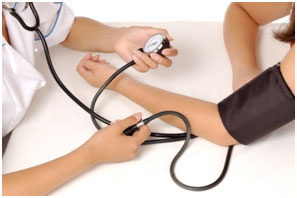Cardio-vascular illnesses
Arterial Hypertension

Also called arterial high blood pressure, is a pressure which is acting very importantly on the walls of the arteries (arterial pressure), which is the nuisance of the developed countries. It is the major risk for a cardiovascular accident. It needs to be treated preventively, with a hygienically diet and a dug therapy. Generally called, silent disease, it is often not detected with numerous patients, which a real sanitary catastrophe.
Nearly 12 billion of chronic high blood pressure in France
11,5 billion persons have to take anti-hypertension drugs
What is arterial hypertension (AHT) ?
An arterial high blood pressure has the characteristic of pressure indicators, either equal of higher than 140 mm Hg for the systolic or 90 mm Hg for the diastolic pressure, after having repeatedly measured the arterial tension.
When young patients are having arterial high blood pressure, it is first due to the diastolic AHT, affecting the small arteries. At older age this illness is affecting the big arteries, and even the AHT systolic.
How is it measured ?
Measuring the arterial high blood pressure can either be done by the GP, the cardiologist, the doctor at the place of work, or at home by measuring it yourself.
Which are the factors of risk?
Some situations are generating arterial high blood pressure: heredity (a child with hypertension runs twice the risk of getting it), too fatty food and/or too salty one, overweight, lack of physical activity, consumption of too much alcohol and tobacco, stress, some drugs and substances.
Which are the symptoms?
Generally, arterial hypertension shows no symptom, likely to alert the patient. Often, it is only detected after a routine medical check-up.
In other cases, however, certain signals let suspect an arterial high blood pressure :
- Morning headache, on the top or behind the head;
- Dizziness;
- Troubles in vision: flying bugs, fog troubling the eye…
- Being tired;
- Bleeding of the nose;
- Conjunctival hemorrhage;
- Cramps of a mussel;
- Frequent urination (or having the feeling of having to);
- Shortness of breath (respiratory difficulty, coming from left ventricular hypertrophy).
How can arterial hypertension can be treated?
Arterial high blood pressure is tiring the heart, even exhausting it, is also affecting the legs, the kidneys, the eyes and for sure also the brain with the risk of having a CVA
Concerning the hygienically diets and the measures to set up an arterial hypertension treatment, means encouraging to eat healthy food, to have more physical activity, and to a moderate consumption of alcohol and to incite people to stop smoking.
These measure have to be completed with a drug treatment.
Which are the treatments with drugs?
The target of an anti-hypertension treatment is bringing back the blood pressure numbers below the 140/90 mmHg line, combating over a long time the cardio-vascular risk for complications. There are different therapeutically categories available to regulate hypertension, and some can even be associated to one another in order to work better.



